After an hour’s flight from Kinshasa that included a breakfast tray of three kinds of stale bread and an equally stale cup of coffee, we landed in Mbandaka, a city that sits on the Equator where the Congo River no longer forms the border between the two Congos but instead sneaks inland a bit into ours. From here, the river continues north for awhile before starting its dramatic arc southwards. (Technically it flows the other way around — beginning in the highlands of DR-Congo and Zambia, semi-circling the country and exiting into the Atlantic Ocean — but I think you know what I mean.) Since it crosses the Equator twice, it’s always in a rainy season somewhere, making it second only to the Amazon in terms of flow rate. It drains into the Atlantic Ocean with so much force that it’s carved out a canyon below the seabed 1,000 meters deep, and fresh water can be found in the ocean 200 kilometers out. (Source: Blood River by Tim Butcher.) Experts say that if the power of this river could be properly harnessed, it could provide electricity for all of sub-Saharan Africa.
Lost? Click here for an overview of our journey.
We were about to get our first real look at this incredible river. But it would be another few days before we’d finally start floating down it. We’re spending the night in a hotel here in Mbandaka tonight, before a long drive tomorrow. Four hours, we heard, to reach a lake. Why we’re going overland to reach water when there’s a perfectly navigable river right here, no one seems to quite understand.
Our flight reached Mbandaka with ease — a relief after that horrible boarding process — and we climbed down from the plane onto the humid, warm tarmac. Mbandaka definitely feels more like a jungle than Kinshasa did. More confusion at the airport as Ernest escorts us away from the obligatory passport check and into a waiting area instead, while he deals with all the paperwork himself. He was gone for what felt like forever. To pass the time I bought a few items from a salesboy for fun — mints, candies, a coconut. Seb noticed a photographer with an instant printer and commissioned a photo. A smelly army officer who looked rather scary but turned out to be sweet insisted that he join us for our photo, and would of course appreciate a copy of his own.
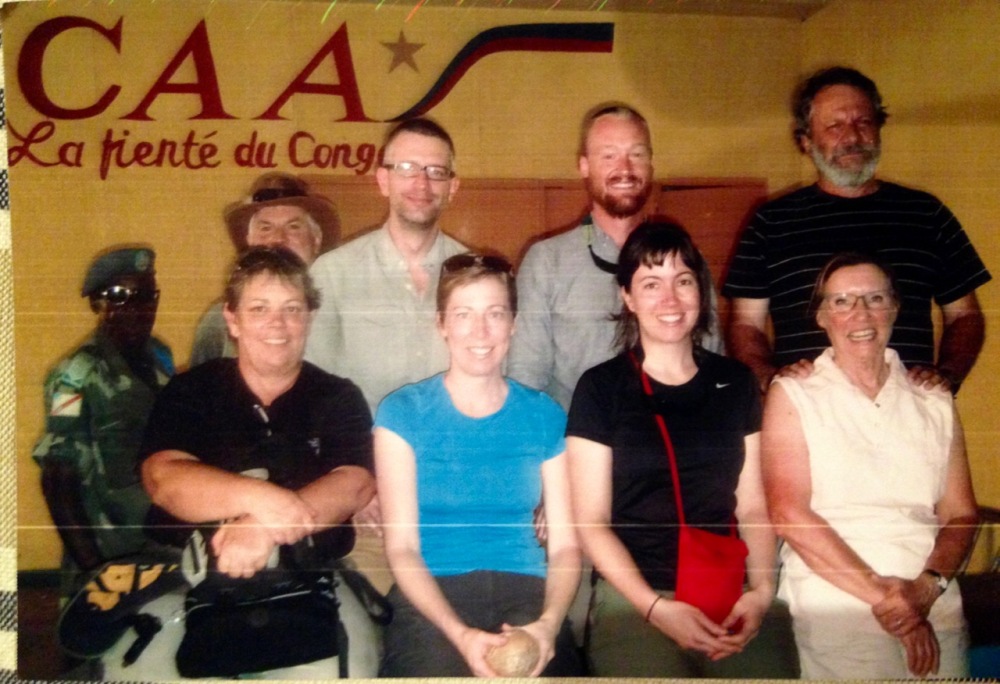
Officer Friendly squeezed Ross out of the photo from behind his wife, Colleen, then there’s me & Seb, then our friends Russ & Laura, then our formidable Doctor Colin & his wife Sarah.
After a long wait inside, we went out to the hot, dusty parking lot for another one while transportation was being worked out. I busied myself with studying whatever was for sale.

plus rambutan (delicious!) and little red sugary berries, meant to contrast something acidic, like an orange
After what felt like 30 minutes in the hot parking lot, half of our group left while the rest of us were escorted on foot out of the parking lot, past the boom gate to get into the airport, and next to a field of cassava, in order to stand and wait longer under full sun. The wait was long enough we wondered if the car that took our friends was planning to make a round trip. Turns out the pickup truck that eventually came to fetch us didn’t want to pay the fee to enter the airport. Or maybe it was too bedraggled to be allowed to enter. Bumpy, uncomfortable, and NO seat belts. Thinking of tomorrow’s four-hour drive, I asked Ernest, “We’re not using this car again tomorrow, are we?” No, he answered. “Tomorrow our car will have seat belts, right?” He looked at me and laughed. “It’s not a joke,” I said, “Very important that we have seat belts.” Yes, yes, he answered.
Along the drive into town I kept having flashbacks to scenes from Zanzibar and Seychelles. It definitely felt like a beachy, jungly kind of place. Quite pleasant, I thought. In town I loved the market scenes — people everywhere, walking, buying and selling. In the middle of a very busy street we pulled up to our hotel for the night, Hotel Karibu (it means “welcome” in Swahili), and found our friends waiting for us on the hotel’s terrace overlooking the busy river. What a great spot! An up-close view of the Congo River, a lot of action to observe. Several boats were docked right in front of us — big ferries full of people, who sometimes wait weeks for the next departure.

Versus a view of our room inside Hotel Karibu. There’s a bathroom partially plumbed — a dead showerhead and useless sink with no drain pipe are attached to the wall. There’s a toilet to be manually flushed with buckets of brown well water, which never quite do the trick (and double as our bathing water). But at least the sheets were clean.
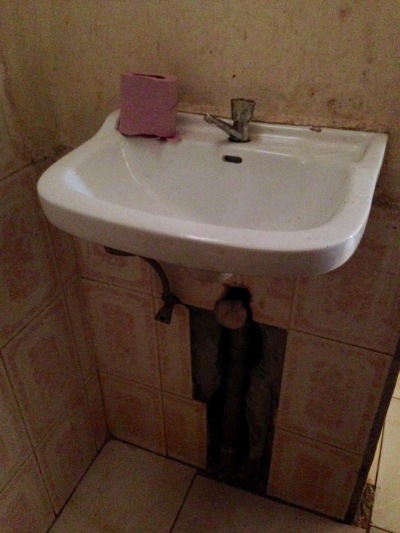
This is not the first time I’ve found in Congo a sink that looks to be recently installed but with no running water and no drain pipe. What is it, a fancy soap holder?
We sat around for awhile, taking photos and snacking on things we had all brought from home while waiting for a plan to materialize. In the meantime I had a little business to attend to. The afternoon before leaving home, one of my English students came to my door. I was expecting him as he’d told me Mbandaka was his hometown, and he was excited to hear I was going there. He wanted to give me some phone numbers in case we needed assistance while we were there. What he didn’t tell me was that he was also bringing two bulky packages, expecting me to deliver them to his family in Mbandaka. I protested, showing him the backpack I had just finished packing, compact but tightly filled, leaving no room for anything more. (By the way, I was absolutely thrilled that I had managed to get everything inside, leaving my hands free as Seb insists they must be every time we travel. I couldn’t wait to show him.) My student just laughed at my pack and said, “That’s all? Good! You can carry these in your hands.”
What could I say? He was offering to help me with his contacts. He happens to be a police officer who I happen to like as far as police officers go and I thought, who knows, his services might just come in handy. Besides, that very morning my friends had thrown me a generous and grand birthday party. I was in a grateful mood and couldn’t bring myself to be uncharitable. So I carried his damn packages through three airports over two days, and couldn’t wait to drop them off. (Yes, I did check what was inside. It was just a bunch of clothes and heavy wax fabric, plus a pair of prescription glasses he said were for his father.)
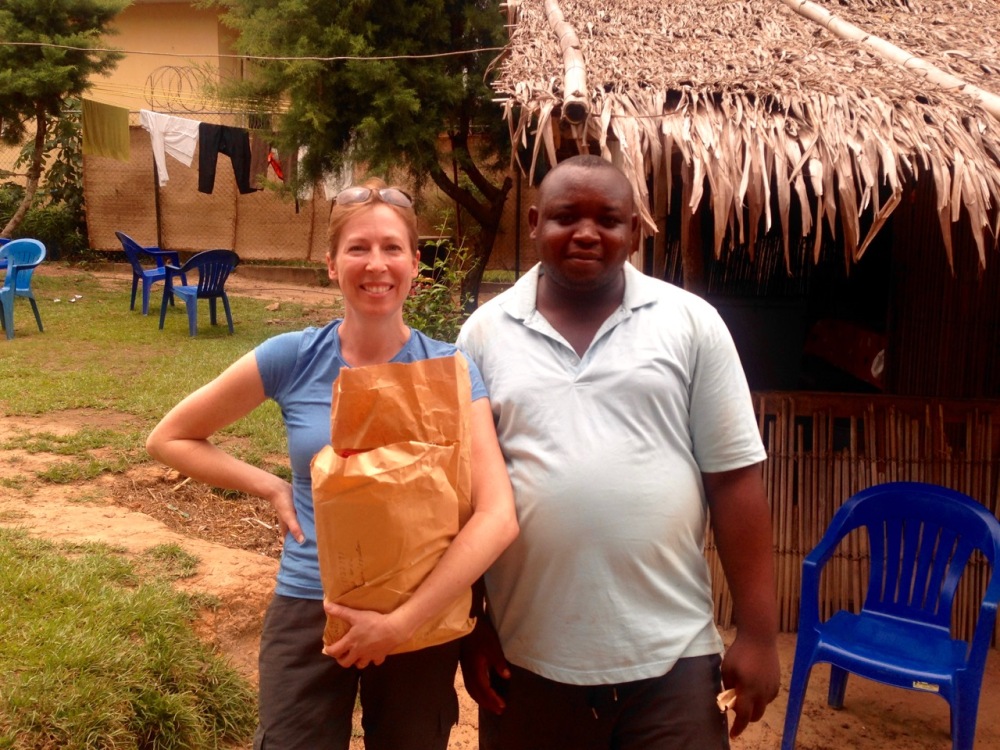
Happy to leave these behind with the hotel clerk, after making contact with the family. I heard later everything made it to them just fine.
After feeding ourselves, our all-inclusive tour took us on a motorized visit of the town. Again the transportation was problematic, as only four of us could go at a time in the one vehicle that had stuck around. A better vehicle this time — a Land Cruiser still sporting the decal of the World Health Organization — although it did require a pop-clutch start on a downhill slope.
Mbandaka was founded in 1883 by Henry Morton Stanley himself, the first European to chart the Congo River, and the explorer of “Dr. Livingstone, I presume?” fame. The capital was almost situated here instead of Kinshasa. In 1947, its city hall was christened the tallest building in the country at 128 feet. In 1973, it was the site of the world’s first Habitat for Humanity project. (All information courtesy of guidebooks, not our actual guides.) Yet today, this city of almost 1 million is practically in ruins. The roads are terrible, and electricity and running water are hard to come by. Even the NGOs are bugging out. At least, that’s the impression Seb got when three different people told him “we need more NGOs here.” Probably because the vehicles they all left behind could stand to be replaced.
Sad. I have three dear friends who each spent a year in Mbandaka in its happier days. Two were regional reps for the Peace Corps in the 70s, one was a teacher, and all report having a lovely time.
The ultimate destination of our city tour was the world-famous Eala Botanical Garden. At least it once was world famous, considered the best in Central Africa according to my Bradt guidebook. Wikipedia says: “The Botanic Garden of Eala (founded in 1900) contains the floral richness of Central Africa with between 4,000 and 5,000 species. The garden is neglected and unfenced and there is illegal logging.” Unfortunately, we mostly noticed the neglected part.
But it was peaceful and did allow us to stretch our legs a bit. While waiting for the second half of the group to join us (we heard our vehicle had to go all the way back to fetch them, but instead they showed up 20 minutes later in yet the same derelict pickup truck from the airport), we walked around and met up with the park director, a nice man who explained he had just begun his duties a few weeks prior, and had a lot of work ahead of him. He led us to a “museum,” an old house that smelled of bats, and asked if we wanted to see inside, adding he didn’t have the keys with him. We opted not to wait for him to fetch the keys, instead walking around the grounds asking various guides what was what, but without getting much of an explanation.
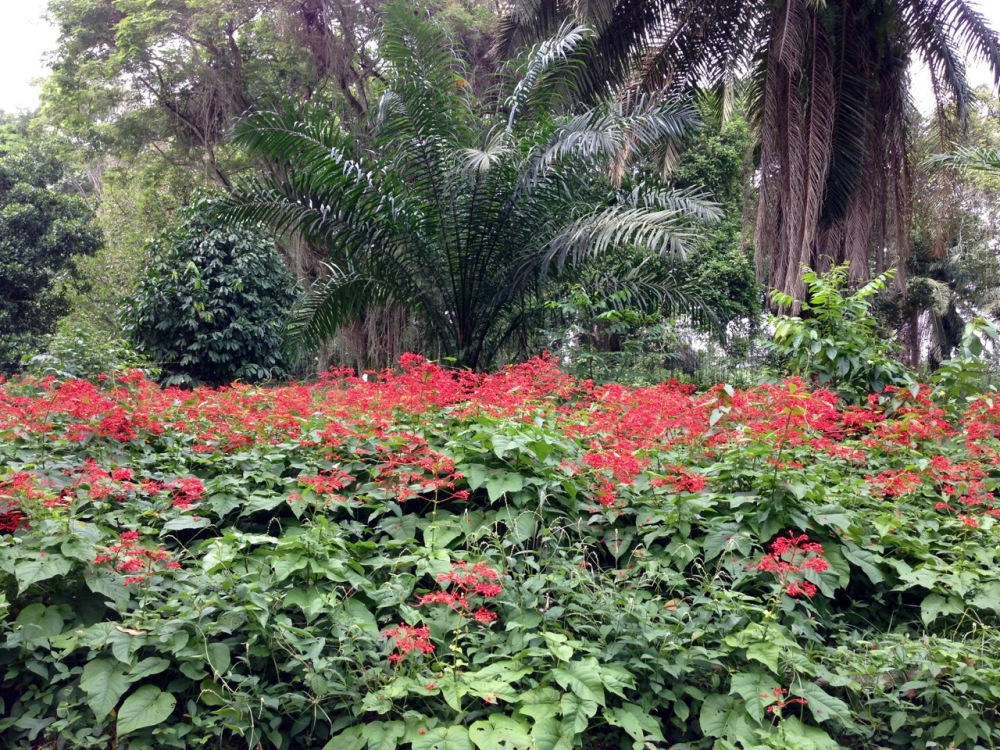
One of the prettier views of the place. It’s too bad we couldn’t camp here in tents tonight instead of tossing and turning at Hotel Karibu…
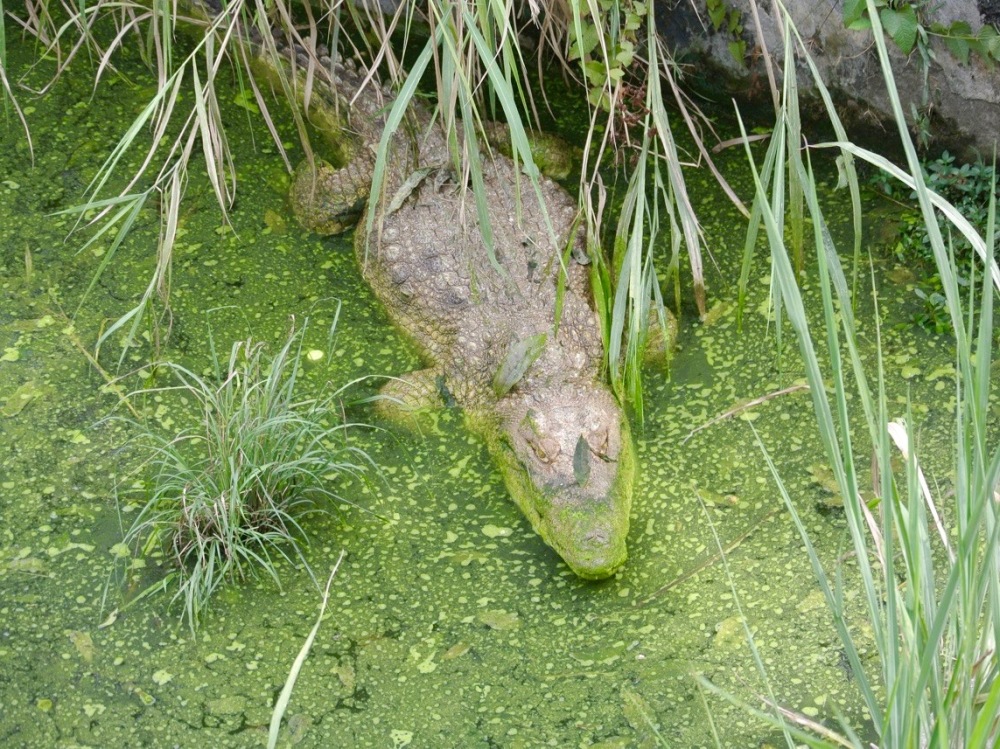
The only crocodile we’ll see on the trip (besides a small one on our plates) — this guy has been held captive in a tiny pool at Eala since 1953 according to our tour company, or 1971 according to our driver.
After we returned to the hotel, this time in a proper caravan of two vehicles at once, we took in a little of the action on the busy market street. Someone spotted a miniature Lucy for sale, a little red-tailed monkey sitting on a young man’s shoulder. “Should we take her home?” we all wondered aloud. For the longest time we’ve all wanted Lucy to have a friend, a mate, a baby. She’s all by herself at base camp, and won’t leave because she knows the dangers that await her outside the safety of our place. So we stood there mesmerized by the little monkey, wondering if we should save the poor creature until the boys who held her announced that we could have her for the special mzungu price of $100.
Technically, here in the north where they speak more Lingala than Swahili, we’re not mzungu anymore. We’re called mundele — a word we would be very familiar with by the end of our trip.
Instead of a monkey, I bought some fermented cassava (manioc) root called chikwange, just because it’s a typical Congolese food and the kids selling them in big buckets on the tops of their heads were cute. Two types to choose from, Ernest said he preferred the one wrapped in banana leaf if I remember correctly. (We sampled it the next day; totally disgusting. But our crew survived on this stuff along with smoked fish, eaten uncooked or unheated. Both were very smelly.)
Soon after that, Seb and I jumped back in the truck with Ernest in search of provisions for the river cruise; namely, liquor. Scotch for the boys and gin or wine for the girls. We drove quite far across town to hit one pathetic store that sold baby care items in one half, booze in the other. As you do. Seb tried to buy two different bottles of Johnny Walker Red Label, but saw they had both been tampered with. The metal seals were broken and the tops had been glued or something. The vendors of course, and Ernest too, insisted they were fine, but Seb said no way and put them back. The Jack Daniels and Chivas looked to be slightly more intact, so he bought those two.

I bought a box of wine bearing the face of a creepy count, but decided later that it tasted quite fine with dinner. Since there was never enough beer to go around, I should have bought more.
Later we would all decide the whiskies were fakes, they tasted a bit like rum and exactly the same as each other. Apart from a few sips they went down the drain. Errr, into the river. Fake alcohol is common around here, we’ve read. But what they’re putting back in the bottles is a bit of a mystery; petrol is sometimes assumed.
After a hot and sticky afternoon passing the time watching the action below us on the river, and taking bucket showers when the generator came on for a brief period of time allowing some light into the dark bathrooms, it was time for dinner. Ernest wanted to take us to a place down the street, so we piled back into our two vehicles. Thankfully they’ve now figured out how to be in the same place at the same time, as we discovered yet another problem with our little pickup truck: it had no lights. We proceeded using the lights of the car behind us (the one that needed a pop-clutch start), going right past a policeman who didn’t bat an eye.
We reached the restaurant and received a menu that looked very promising — all kinds of pizza and pasta, soups, salads, sandwiches and more. A murmur of excitement and a second wind came across our group. But when the waitress came to take our order, she announced the kitchen was serving only four things that evening: fish, chicken, ribeye, or sausage. The vegetarians among us asked about vegetables. The answer: no vegetables. No vegetables! How can that be? (There was even a “potage aux legumes” on the menu.) No potatoes, even? She said no but appeared to have trouble understanding French. Fries, plantains, and even a nice vegetable sauce made an appearance later.
Dinner ended up being totally delicious. Almost all of us chose the lightly pan-fried Capitaine (Nile perch), which was perfectly cooked and tasted very fresh. (Nile perch is a huge fish, up to two meters long! But they’ve taken over the lakes and rivers in Central Africa, eliminating several other endemic species. Check out this photo of the beast.) No idea the name of the place, but it was along the river at the very end of the market street, off by itself. We noticed, though, that when the bill came Ernest made no moves to pick it up. Second dinner (and third meal) in a row that’s apparently not included in our all-inclusive trip.
The four of us from the unseat-belted no-lights no-suspension pickup truck asked if we could walk home, wanting to stretch our legs anyway. Ernest walked with us and we got some looks and some “mundele” calls but it was all quite fine, and the hotel supposedly 2km away appeared quickly. Before leaving the restaurant I had asked Ernest again, “Are we taking this truck to the lake tomorrow?” No, no, was the answer, as if it were already settled. Yet tomorrow morning, our departure would be delayed about an hour while, we heard, they tracked down a suitable replacement.
Back at Hotel Karibu we went to bed, but struggled to sleep. We take malaria prophylactics every day, but there are plenty of other diseases that mosquitos carry, so we insisted on using the room’s funnel-shaped mosquito net which hung in such a way that it was always touching us. Or sticking to us, rather. It definitely did not smell good as we lay there sweating all night. The room was super hot and the air was heavy and still, as there was no fan in our room. The generator was running again and just steps away from us was a group of men loudly enjoying a movie on someone’s computer. We had the room at the end, closest to the terrace as well as the main stairwell, and listened to loud comings and goings all night long through the gaping holes around our door and window. Can’t wait to get out in the country and sleep under the stars.
In the morning we peeled ourselves out of bed and net, rinsed off a bit, and found our group digging into a breakfast of avocados, bananas, bread, and instant coffee. It was then that I think I met our trip director Serge, Ernest’s boss, for the first time. I remember this occasion anyway because he asked us what we wanted for lunch later that day. He gave us a choice between two menus: fresh fish, rice and beans — or canned mushrooms, canned corn and canned peas. Oh boy. We voted for the fresh.
While waiting for our transport to be sorted out, we took another walk through the market. Quiet for a Sunday morning, but still fun. We bought more probably-fake alcohol (Pastis), some cheap flashlights, and more toilet paper, even though Ernest said there was already plenty on the boat. (Buying more turned out to have been a very good plan.) There was plenty of food for sale too, but Serge seemed more comfortable hanging around the hotel with some buddies, drinking and smoking. Instead we ended up making several stops along the drive later that day to buy whatever food the tiny villages had for sale, mostly plantains.

The best pickup truck so far, with working seatbelts (especially useful since we suspected mid-route that the brakes didn’t work)
Finally we hit the road, only to stop minutes later for some sort of provisions. The first of many unannounced, unexplained stops by our crew. To pass the time, we bought soft drinks from kids selling them, and sat or stood around taking pictures.

Entertaining curious kids by taking photos of them and showing them the result, until the phrase “give me money” was uttered by the older ones who knew some English
Eventually we got moving again, and stopped on the outskirts of town, this time to mark the passage of the Equator. We assumed this was significant and had lots of questions, but very few answers as Ernest and Serge spent most of their time talking with the Person Responsible for the Equator, a man dressed in tatters who appeared very impaired.
As we got back in our vehicles to leave, Equator Man became very agitated. There were raised voices, maybe an argument between him and our crew. I heard him say something like “give me money” as he grabbed my arm and shoulder through the open window (I just happened to be closest), but ended up fumbling with my lifesaving seatbelt that was in his way. He was knocked off balance and then threw himself solidly against the truck as we sped away. Slightly scary, but I have to say my gut reaction was to laugh.
Our crew said they had taken care of whatever money was due to him. I hope they’re telling the truth.
Beautiful scenes along the drive: bamboo fences, brick or mud houses with thatched roofs, palms everywhere, so green! People seem to spend all their time outdoors, walking, working, or talking with their neighbors. Every “proper” house or colonial-era building we pass smells of bats, these places having been abandoned long ago and probably not quite right for the climate. The locals are smart to live in little huts instead, if you ask me.
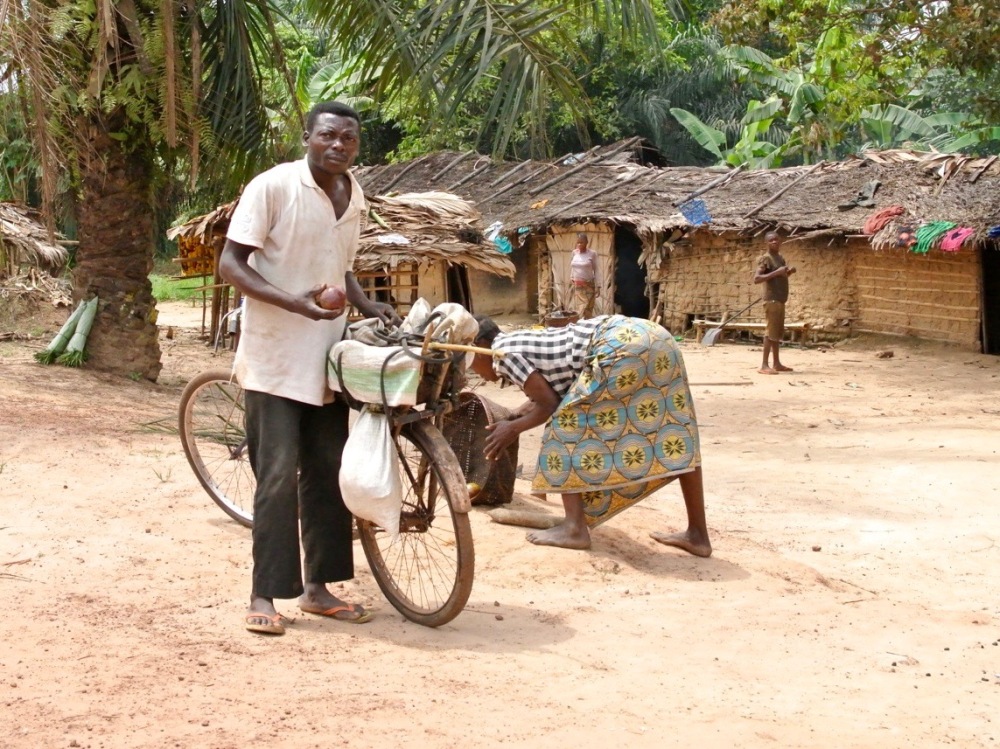
Avocados and cassava, maybe? Not sure. But I’m still taking posture lessons from these beautiful ladies!

One of many broken-down trucks on our route; people who had been riding on top of this load were around or under the truck now, for shade

A well-organized person lives here, though it might be hard to see if you haven’t lived in Congo as long as we have… the dirt impeccably swept, shoes perfectly lined up, bricks neatly stacked.
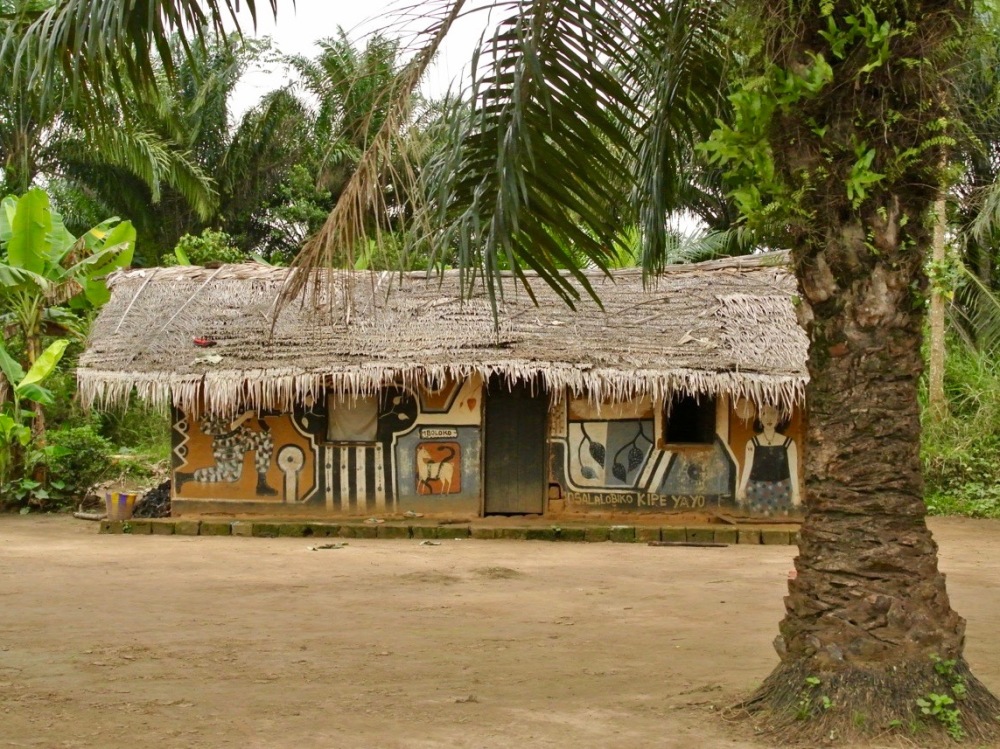
Towards the lake we passed several villages of these decorated houses… our guidebooks (and guides) say nothing… anybody know what this is about?

His house says, “It’s no good to run. There’s no rush.” Boy is that true for people on foot. But it’s the opposite behind a wheel.

Except for this little guy on one of our sweet-potato buying missions; he just scowled at us the whole time
Finally, after an entertaining drive but a long, bumpy and dusty one, we reached our destination: Lac Tumba. Technically a lake, not yet the Congo River, but we’re happy to get out of these vehicles, see a large expanse of water, and get the first glimpse of our floating home for the next week. I don’t know about the others but I was also happy to see a woman on board! Much relieved to put my stomach in her hands, rather than Ernest and Serge who don’t exactly excel at organization.

A super delicious welcome lunch of fresh fish, red beans, amaranth greens, sautéed plantains, and a piri-piri (hot pepper) condiment. Plus red and brown faces from the dusty drive.

Along with the nasty chikwange, we sampled another of my random purchases from the market called safou. After boiling what looks like a tiny purple eggplant, you scrape off the skin and eat the avocado-like meat. Tasted all right, like super sour guacamole, but a lot of work for very little reward given the huge seed inside. Good thing I’m not in charge of our meals.

After oranges for dessert, Ernest wanted us to sample a kola nut. Beyond bitter, this thing! Inedible. And the bitter aftertaste lasted for ages. Only a sample of local “whiskey” (a single distillation of corn and rice) called agene helped lessen it.

We never found gin but Ernest was able to procure some vodka for our sundowners. It was cloudy which vodka is not supposed to be, but us girls drank it anyway most evenings. Hit the spot.
A serene ending to this day, and a toast to the beginning of our river cruise. Cheers!
Next up: Camping at Lac Tumba and the IRSAC reserve

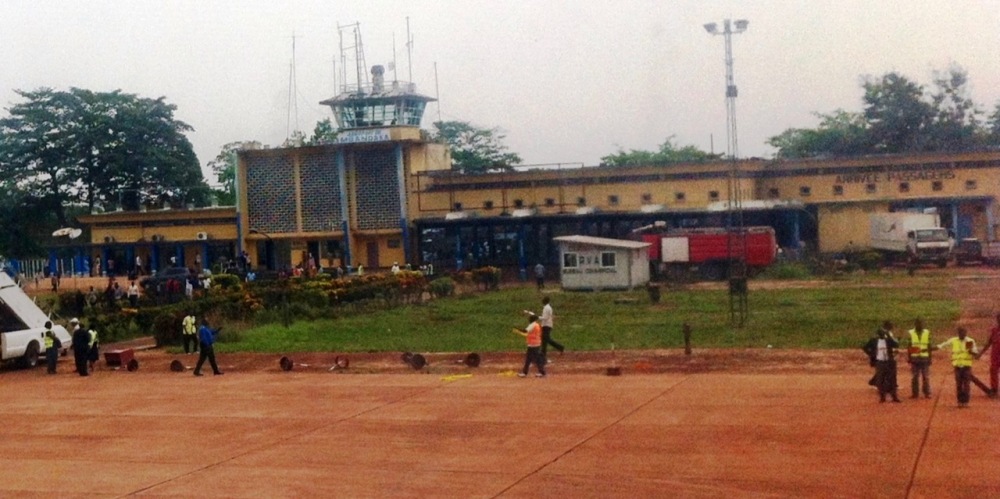
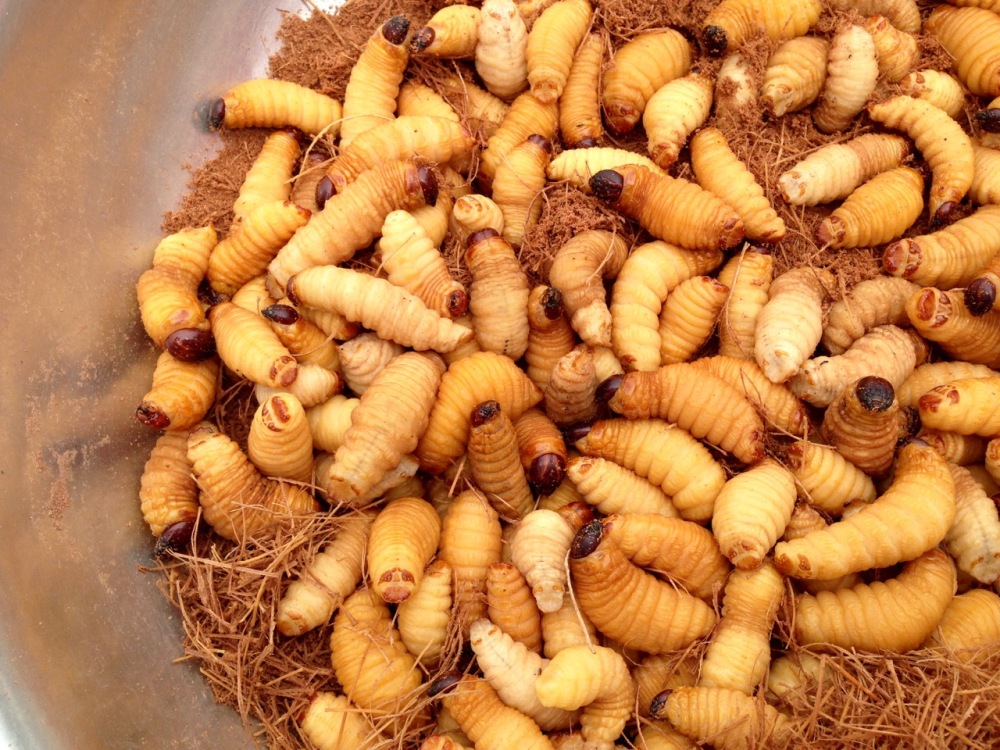

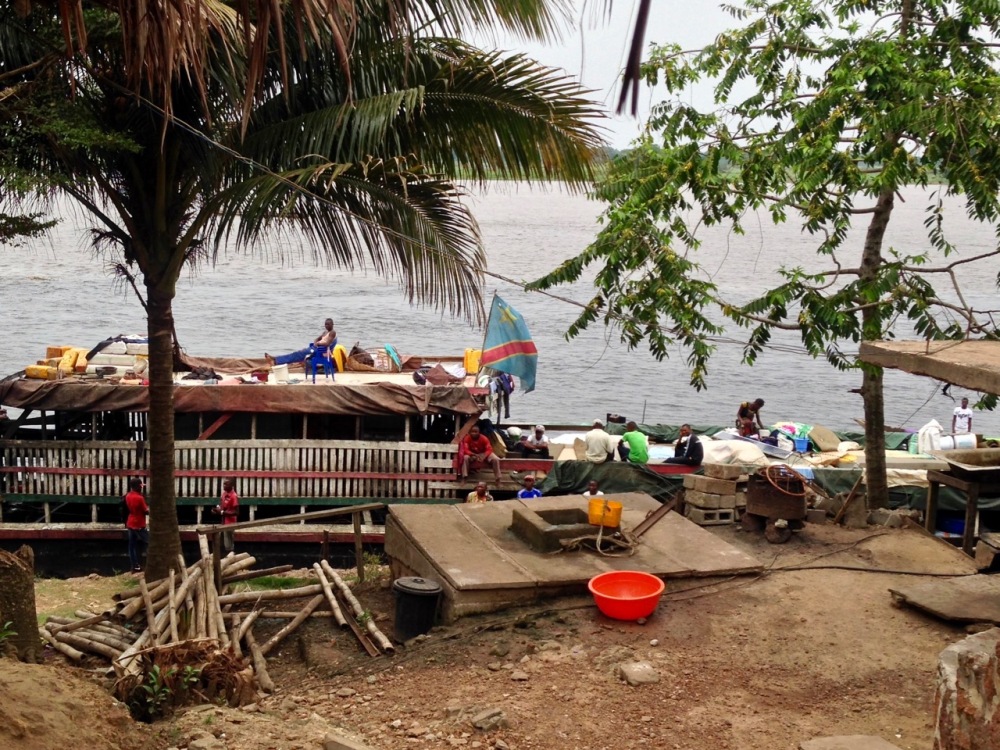


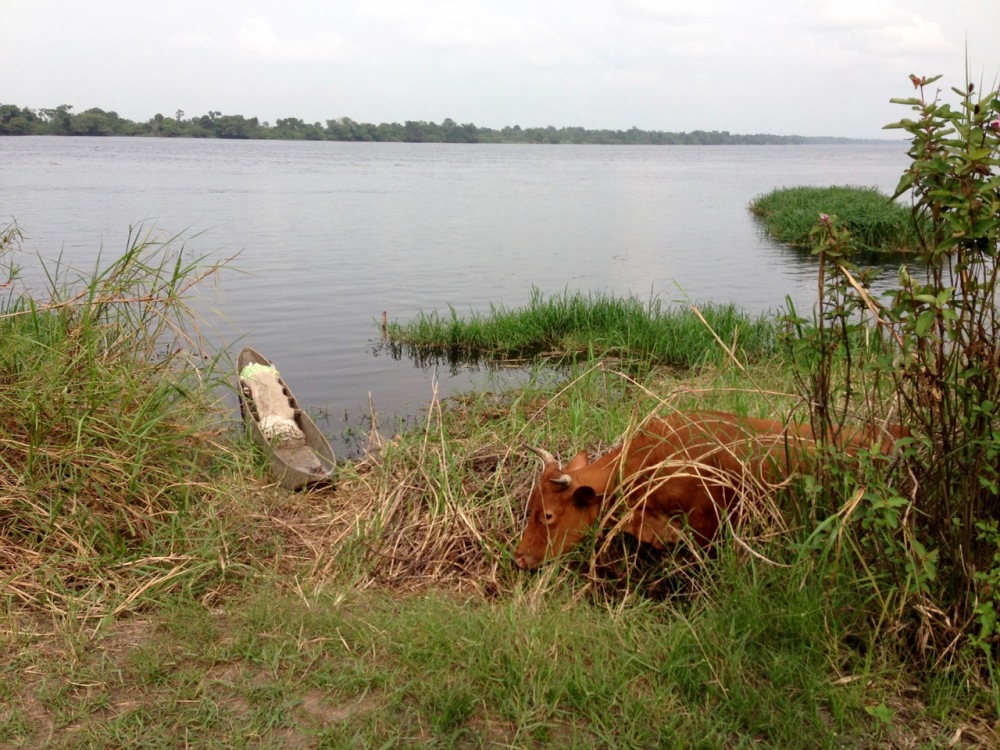
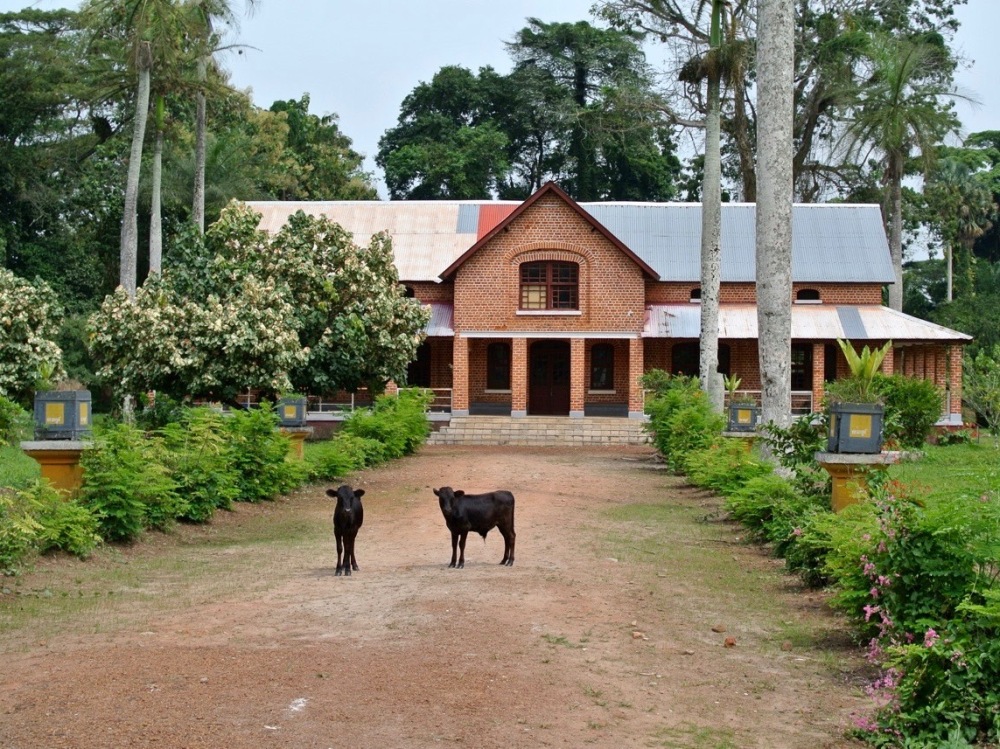
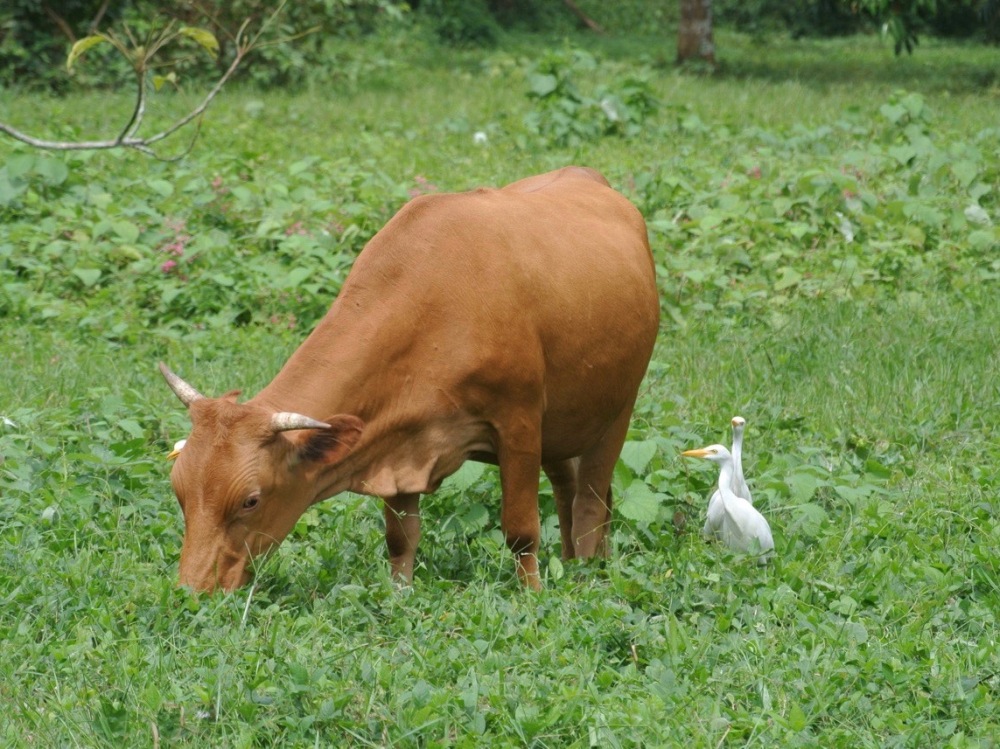
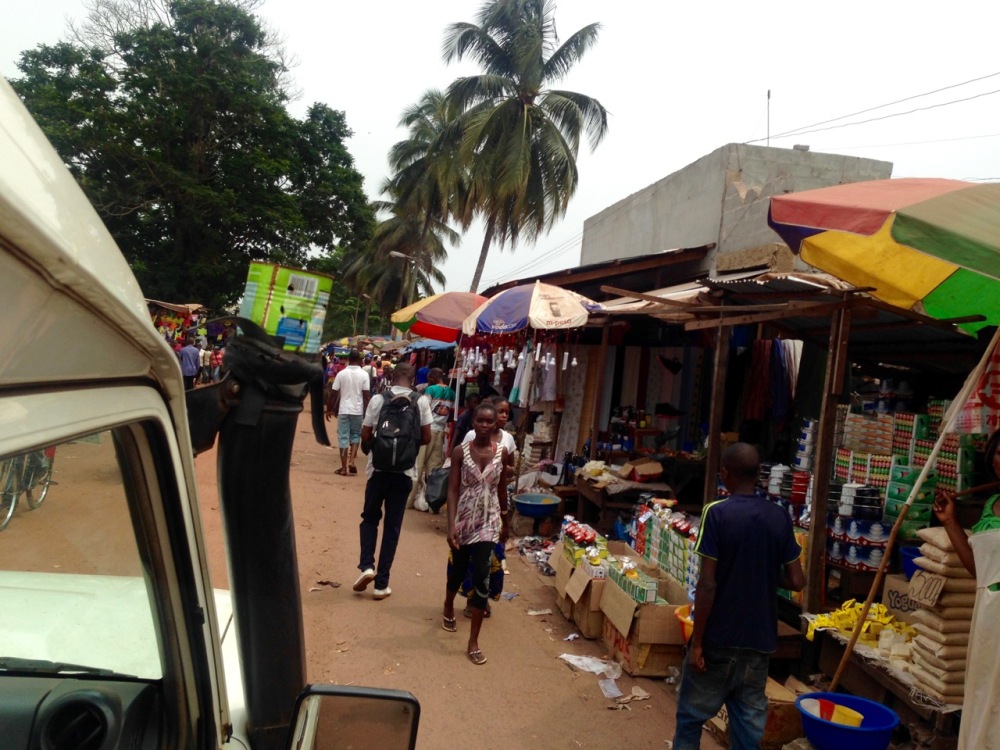
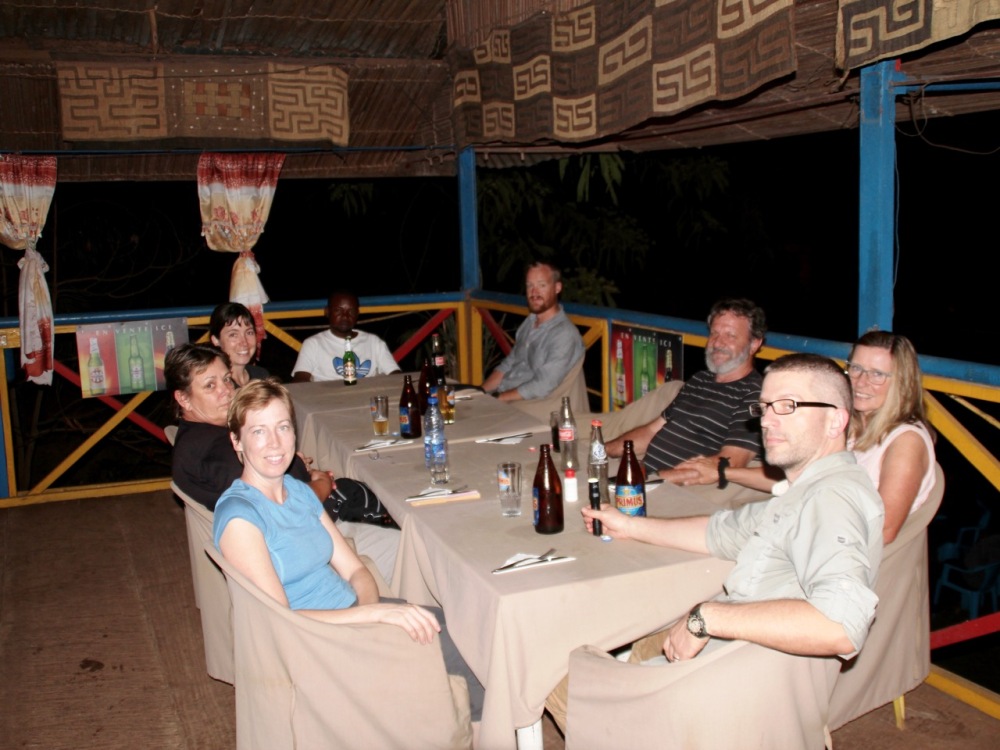
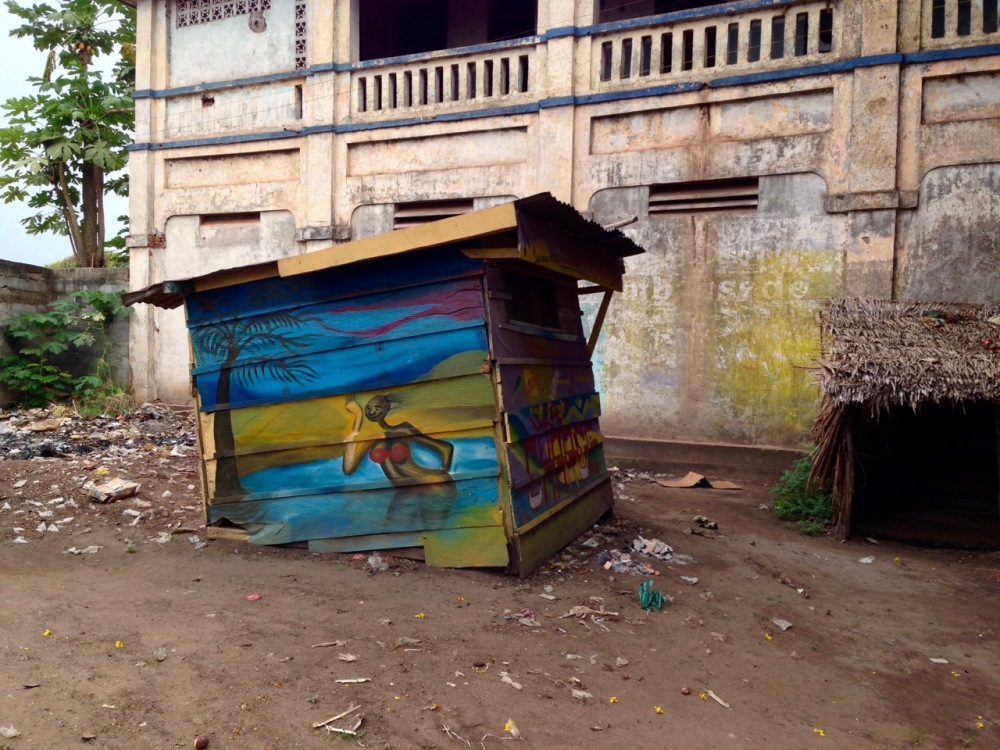
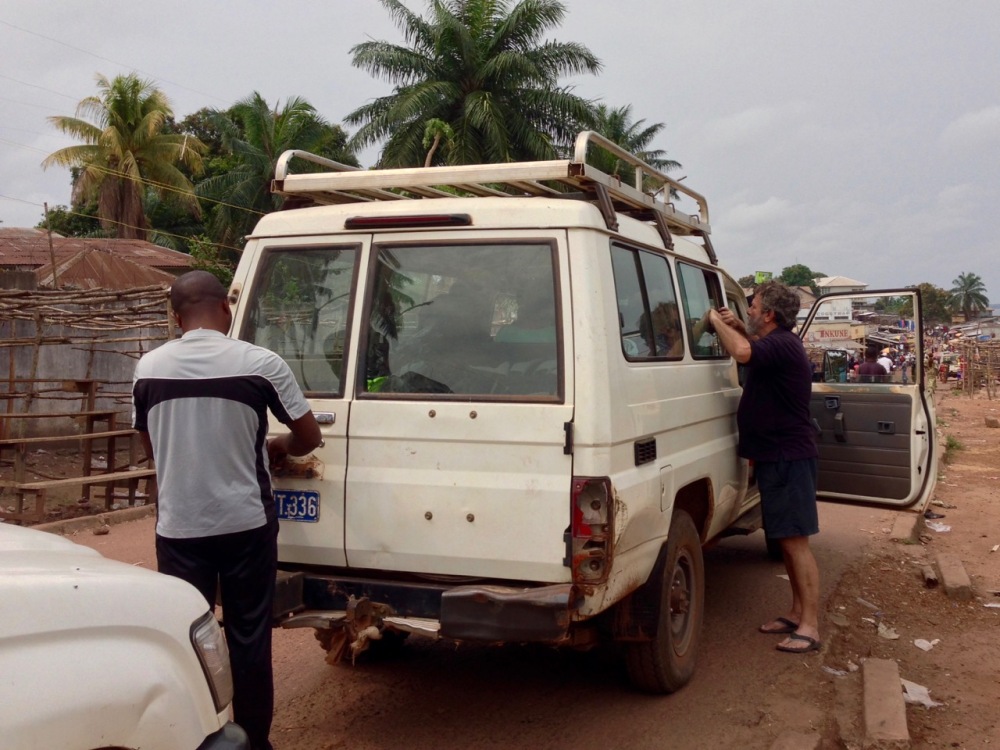



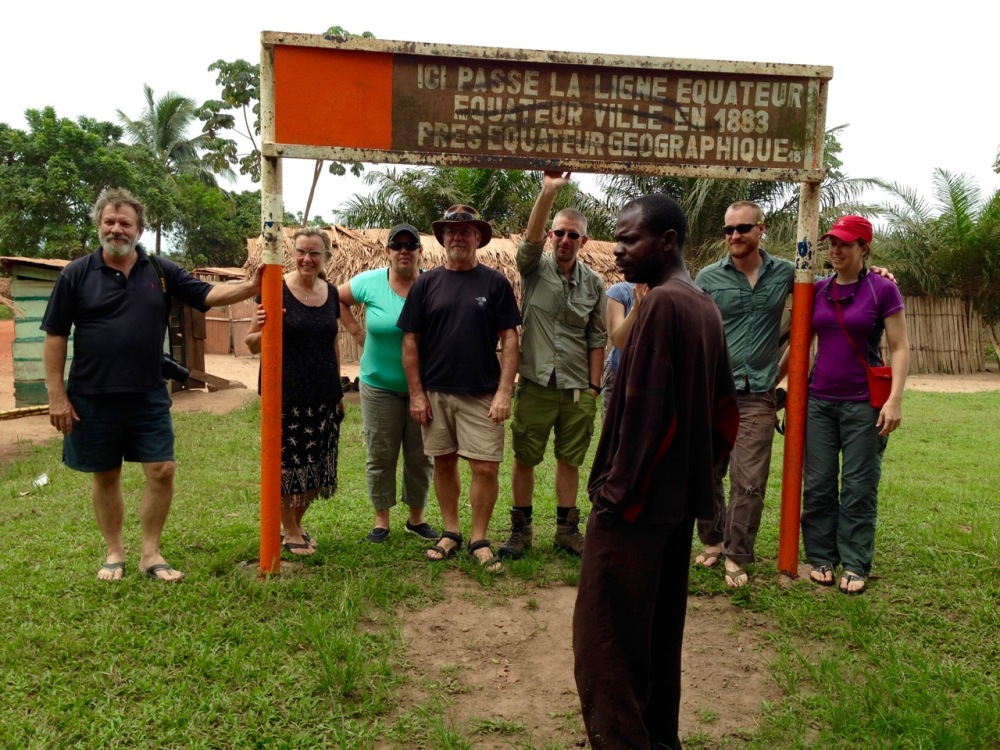
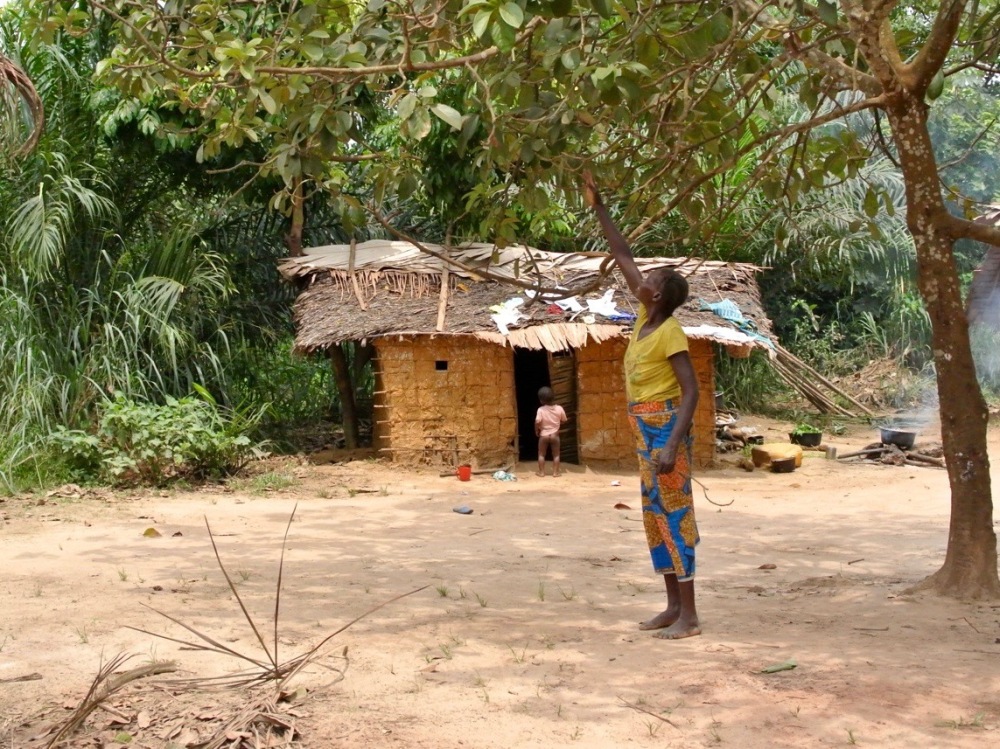
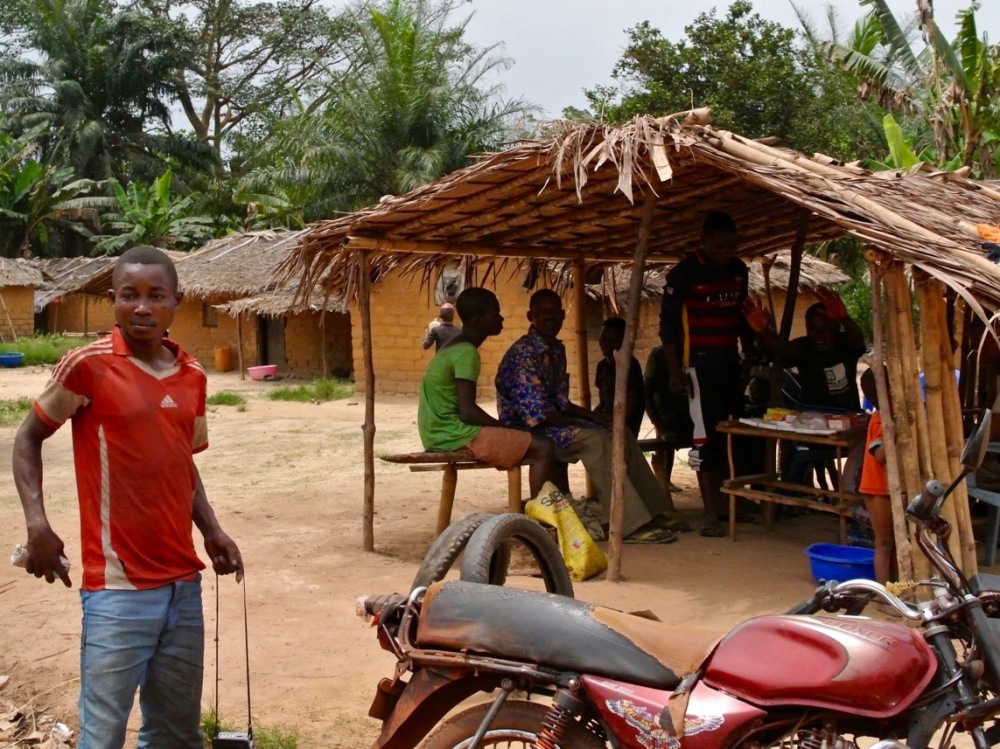
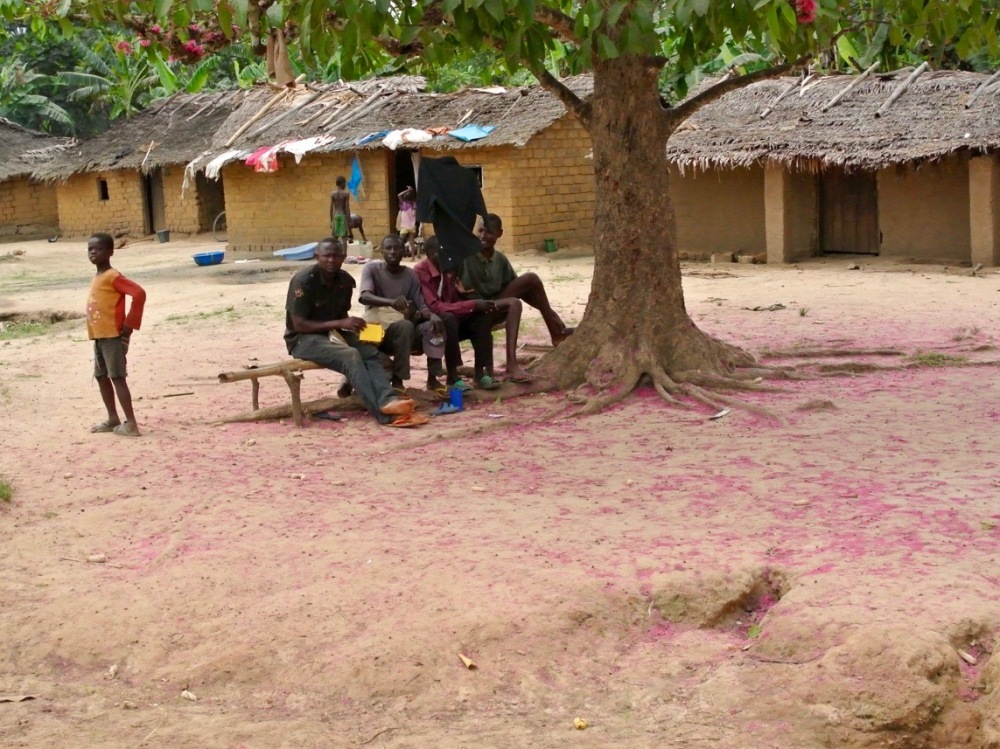
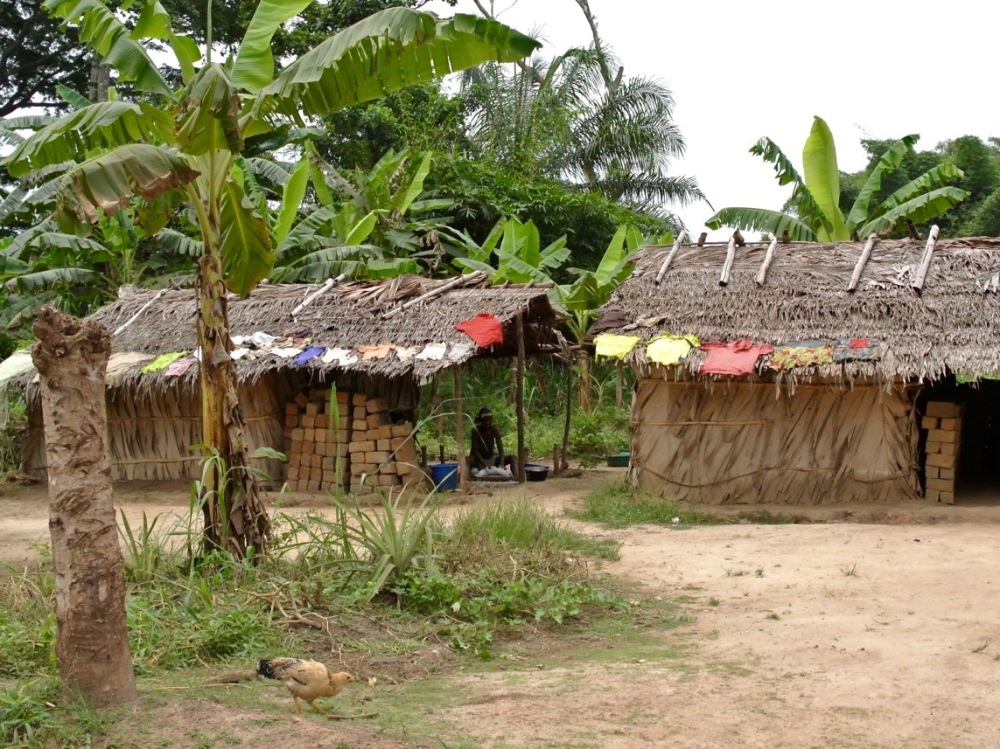
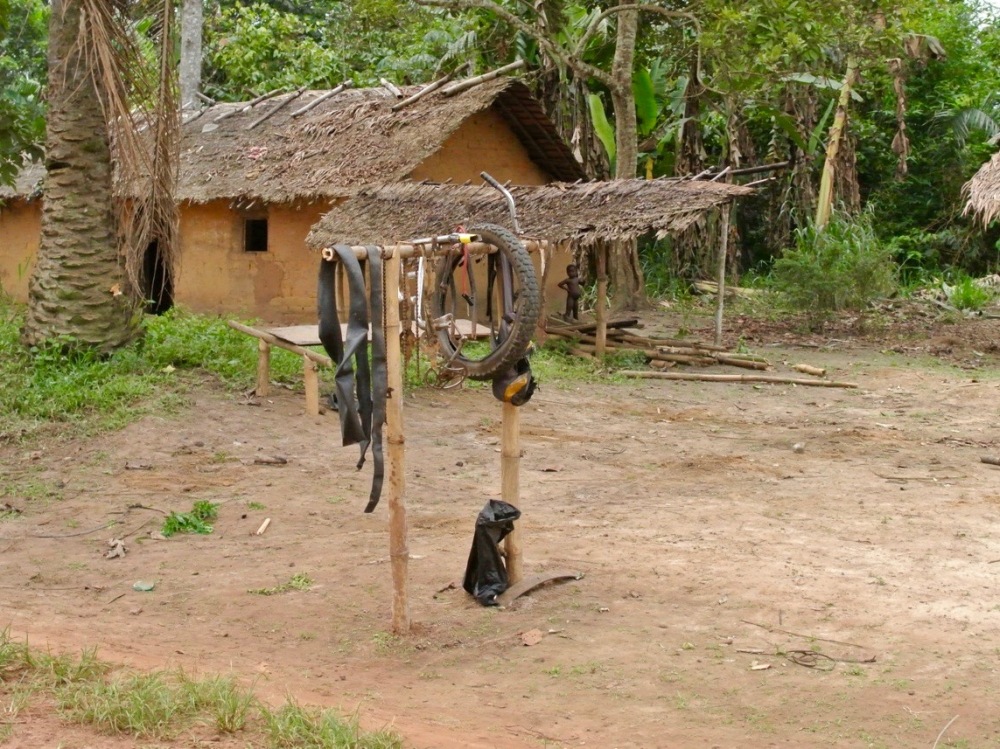
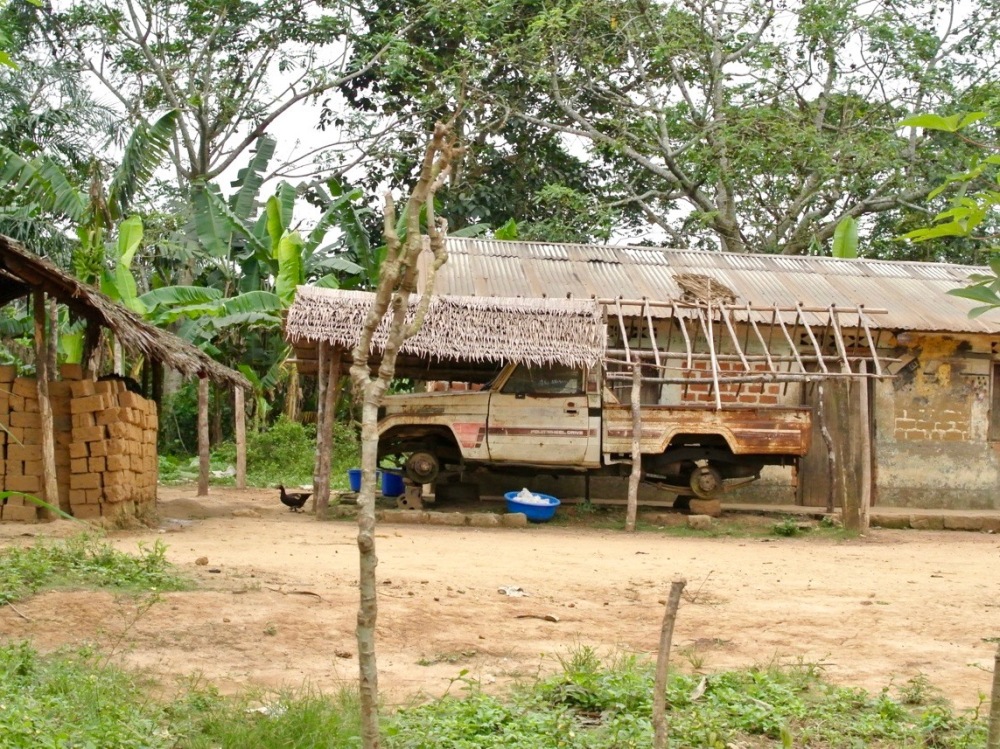
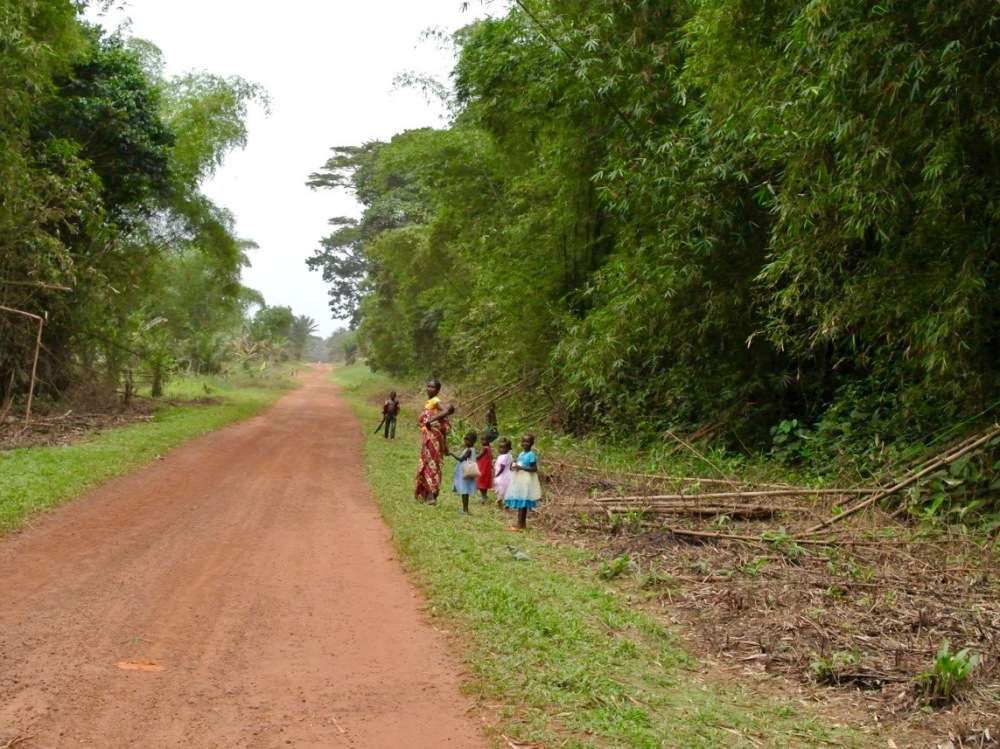
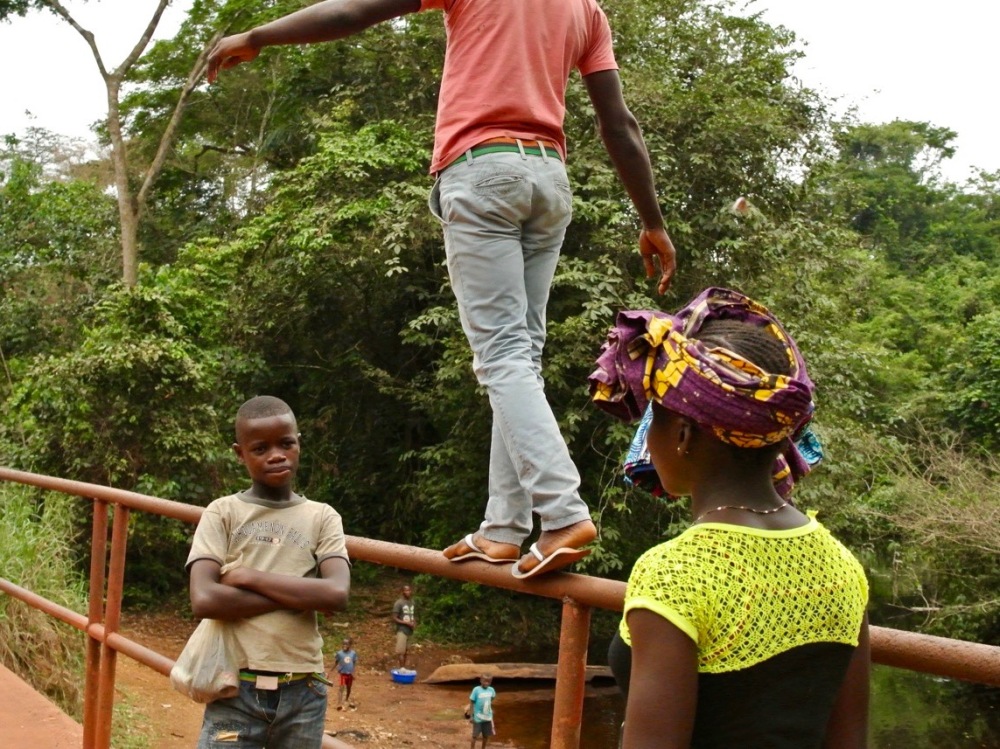
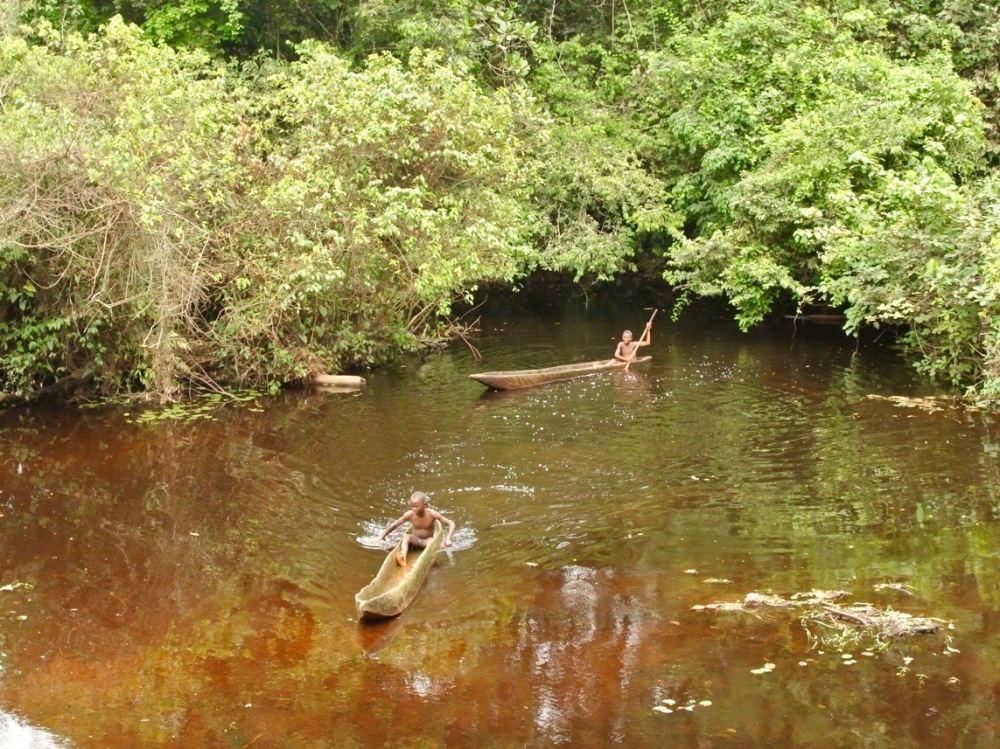
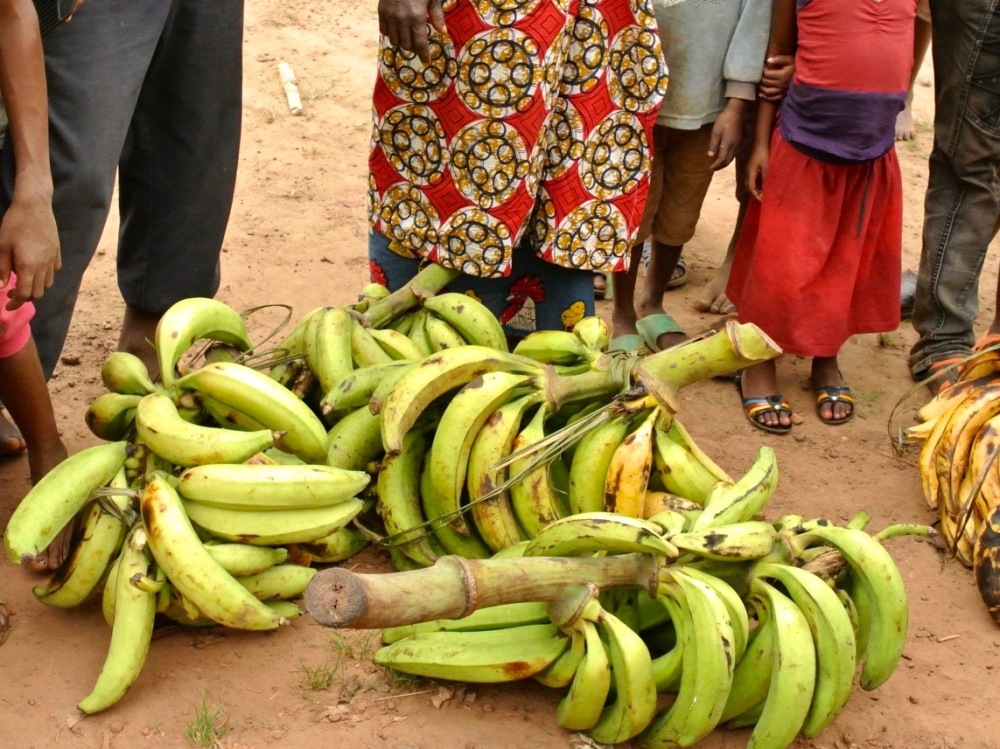

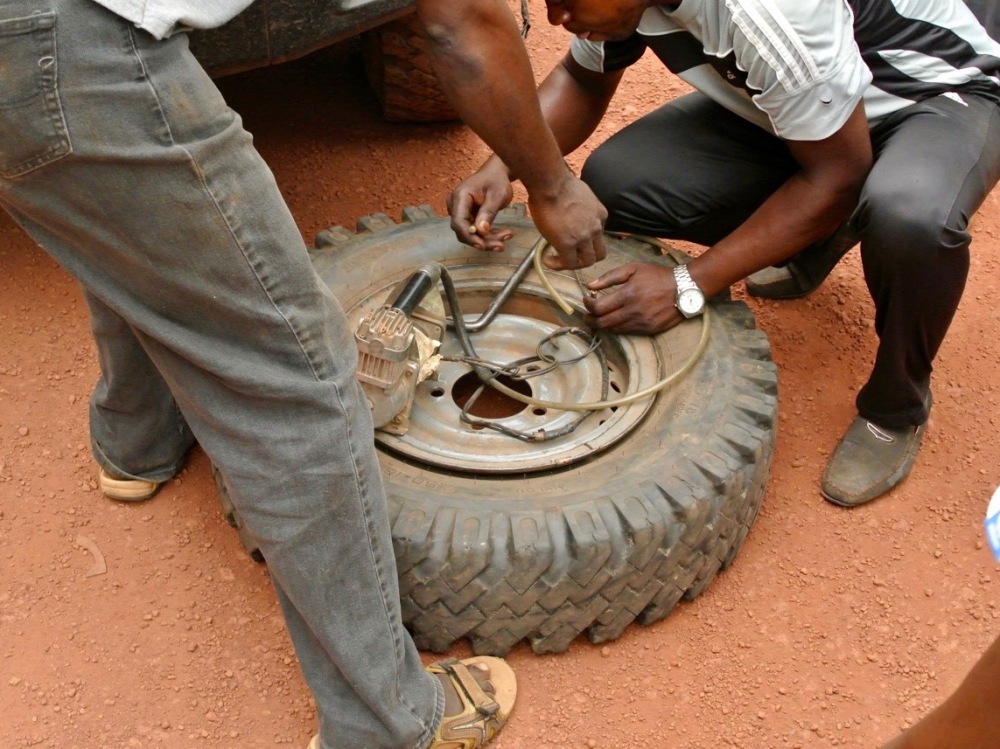
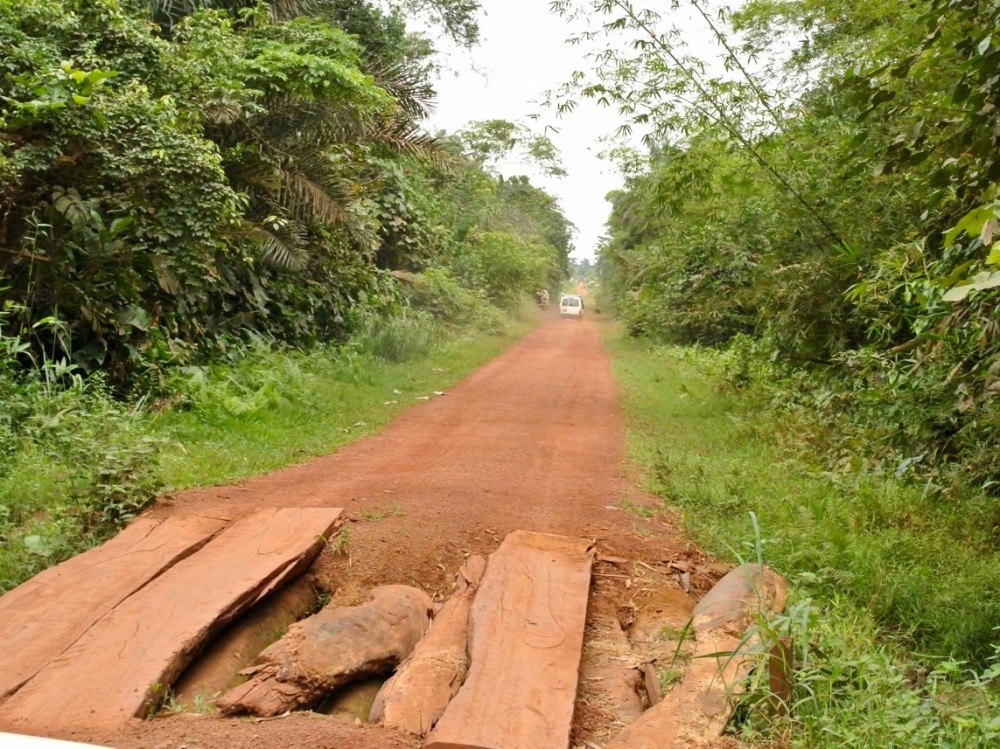
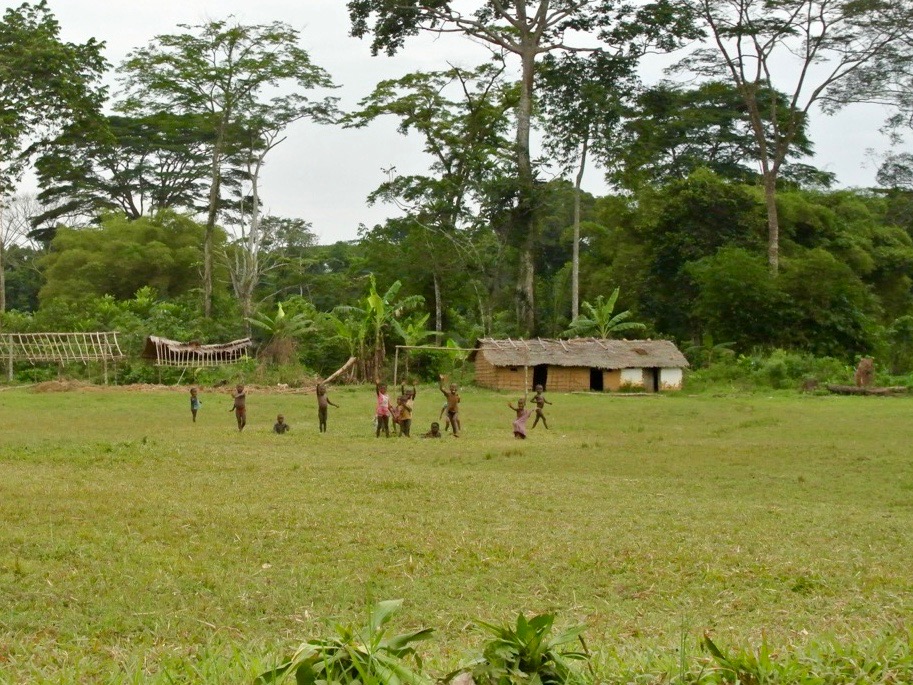
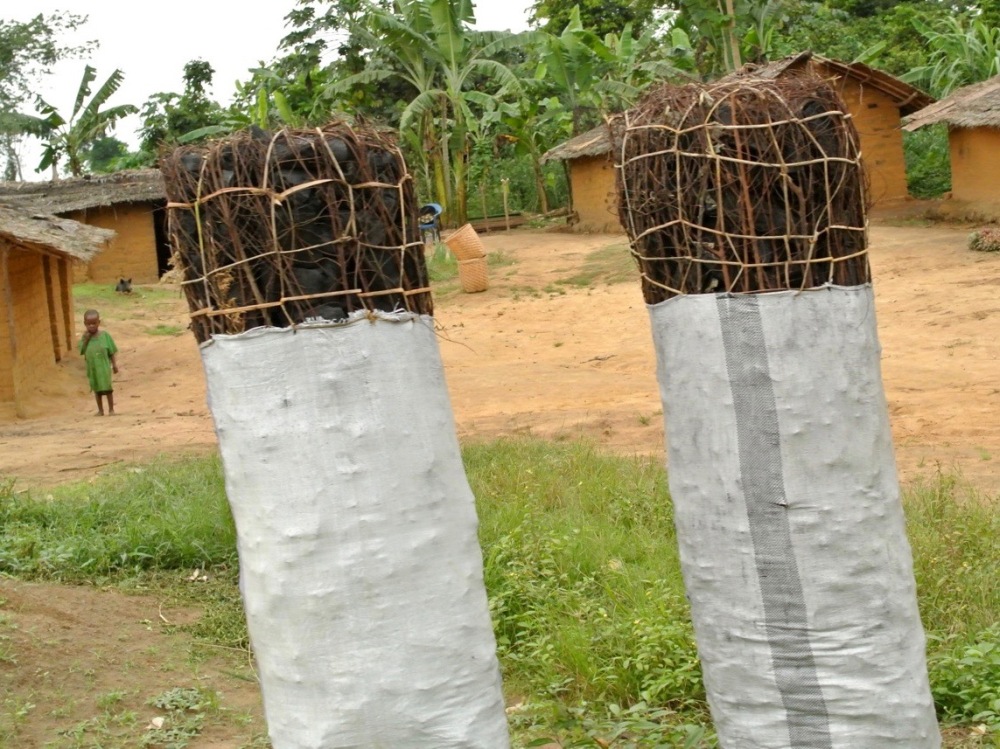
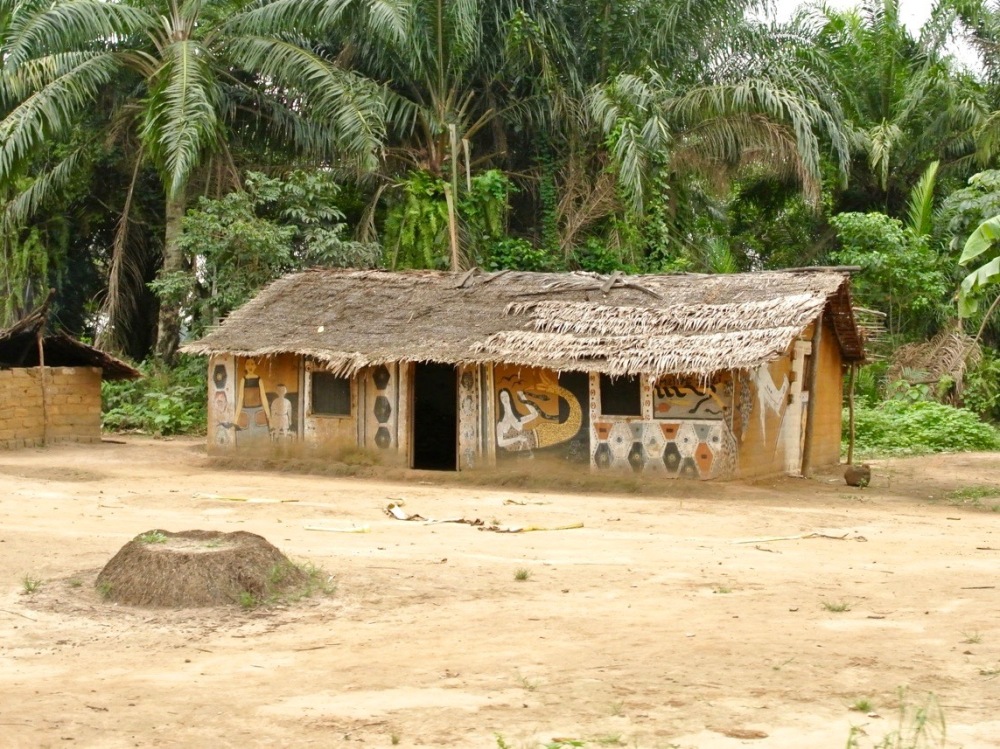

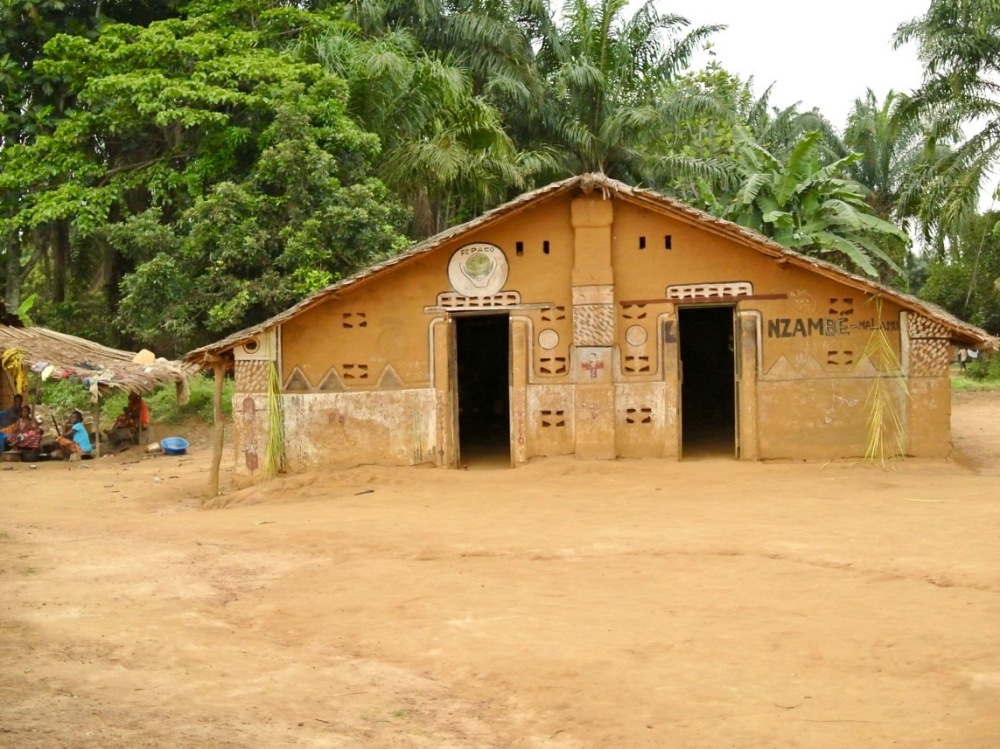
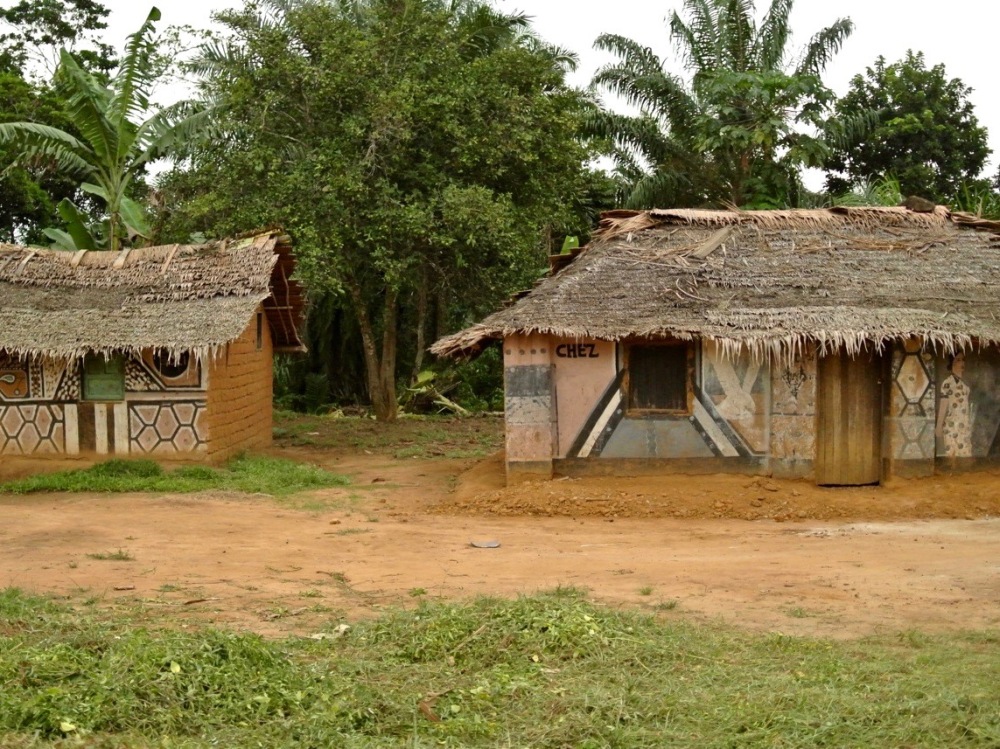

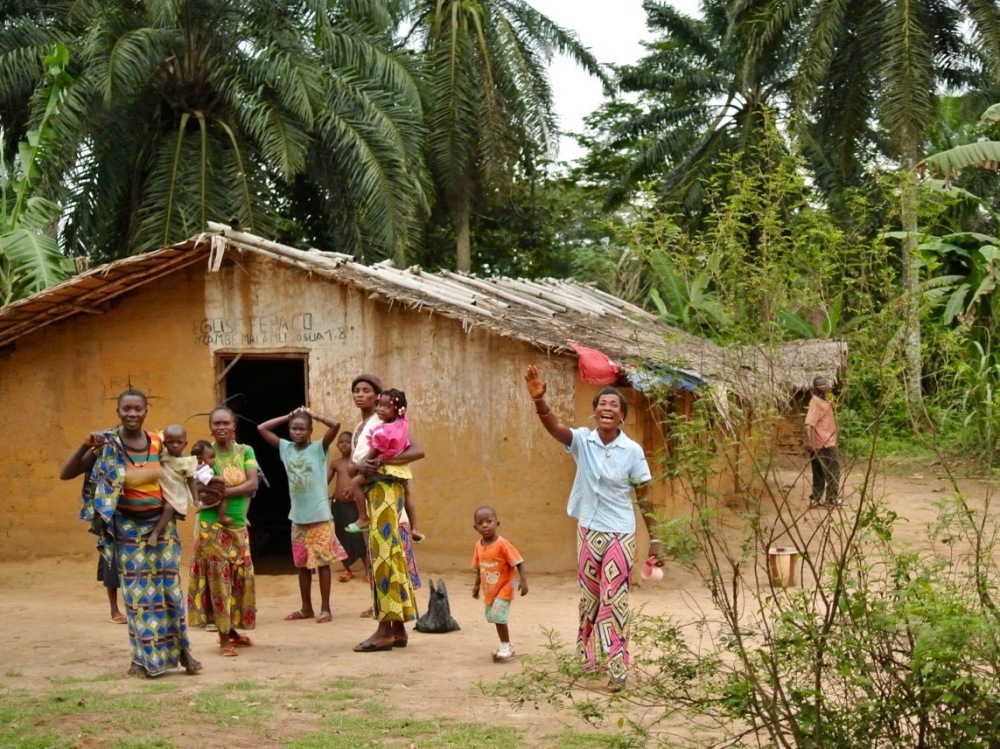

Wow! What an adventure! So impressed with your coping skills. Great pictures too!
LikeLike
Haha, yes, those coping skills were put to the test! Actually, because I had read so much about other journeys and had my expectations set very low, it wasn’t too hard. Seat belts were about the only thing I insisted on having! (Though the next day my “question” about a toilet would be taken as a “demand,” which the others teased me mercilessly for…)
LikeLike